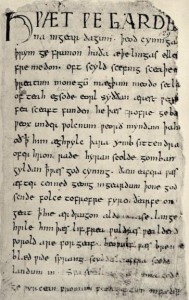 Sydney Morning Herald writer Darryn King examines Tolkien as the progenitor of the art of conlangs (constucted languanges). But, as King points out, for Tolkien the language always came first and his works were ultimately developed to give to give voice to his invented tongues.
Sydney Morning Herald writer Darryn King examines Tolkien as the progenitor of the art of conlangs (constucted languanges). But, as King points out, for Tolkien the language always came first and his works were ultimately developed to give to give voice to his invented tongues.
If you’re curious to read some of the primary sources for this, I recommend Letters #294 and #297 from The Letters of J.R.R. Tolkien.
The fairytale opening line of J.R.R. Tolkien’s The Hobbit is among the most memorable and beloved in literature: “In a hole in the ground there lived a hobbit.” It is an unassuming first sentence for what turns out to be an epic fantasy saga about good and evil, and one of the most influential works of fiction of the 20th century. Continue reading “Tolkien’s Hobbit born of humble words”
Posted in:
Share:

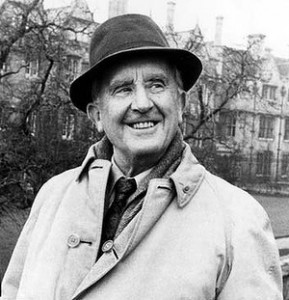 BBC Wales have produced an online guide, via their iWonder site and presented by Dr Dimitra Fimi, about how the Welsh language inspired Tolkien, called “Why do the Elves in The Hobbit sound Welsh?”
BBC Wales have produced an online guide, via their iWonder site and presented by Dr Dimitra Fimi, about how the Welsh language inspired Tolkien, called “Why do the Elves in The Hobbit sound Welsh?”
What does Welsh have to do with it?
JRR Tolkien’s The Hobbit and The Lord of the Rings combine timeless storytelling with the creation of a mythical world with its own races, history, music and languages.
The invention of new languages went hand-in-hand with the shaping of the characters that spoke them. And while Englishness is at the heart of the Shire, the home of the hobbits, for his other races Tolkien looked beyond England.
Sindarin, the Elvish language used in Peter Jackson’s film adaptations, shares many key characteristics with Welsh. How did a proud Englishman like Tolkien become so entranced by the Welsh language?
[Read More]
Join us in Los Angeles in February at The One Last Party
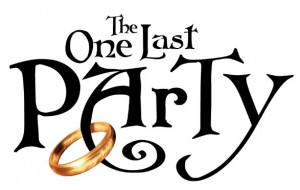 We’re hosting a Party of Special Magnificence next February — a final toast to all SIX movies, both The Lord of the Rings trilogy and The Hobbit trilogy.
We’re hosting a Party of Special Magnificence next February — a final toast to all SIX movies, both The Lord of the Rings trilogy and The Hobbit trilogy.
We’re inviting you to join us and make it happen through our Indiegogo campaign — so we can all celebrate Peter Jackson’s Middle-earth movies together!
Visit our campaign page and find out how you can help!
If you have a Tolkien/Middle-earth inspired poem you’d like to share, then send it to poetry@theonering.net. One poem per person may be submitted each month. Please make sure to proofread your work before sending it in. TheOneRing.net is not responsible for poems posting with spelling or grammatical errors.
Posted in:
Share:

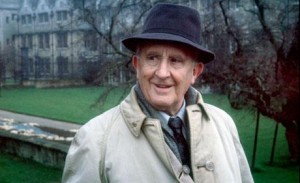 It’s the centenary of Middle-earth.
It’s the centenary of Middle-earth.
In a piece in The Guardian, Tolkien scholar John Garth analyses Tolkien’s 1914 creative breakthrough — and the poem The Voyage of Éarendel the Evening Star from 24 September 1914 — that ultimately leads to Middle-earth as we know it today. Continue reading “Tolkien’s 100-year-old poem that marked the beginning of Middle-earth”
If you have a Tolkien/Middle-earth inspired poem you’d like to share, then send it to poetry@theonering.net. One poem per person may be submitted each month. Please make sure to proofread your work before sending it in. TheOneRing.net is not responsible for poems posting with spelling or grammatical errors.
Posted in:
Share:

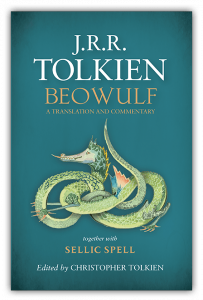 There’s a lot of excitement floating round academic communities for J.R.R. Tolkien’s forthcoming Beowulf translation (which you can pre-order here) where the prevailing buzz seems to be “best thing since slices bread”. Here, writer Mabel Slattery outlines why.
There’s a lot of excitement floating round academic communities for J.R.R. Tolkien’s forthcoming Beowulf translation (which you can pre-order here) where the prevailing buzz seems to be “best thing since slices bread”. Here, writer Mabel Slattery outlines why.
EDIT: There is an error of fact within the article. Michael Drout did not actually re-discover Tolkien’s Beowulf translation.
I did not “discover” the Beowulf translation, not even in the sense that I found it in the Bodleian Library. This claim is a conflation of a story about one manuscript with information about a totally different text.
The real story is not quite as exciting.
You can read Drout’s explanation in full here.
Don’t forget to click the link to read the full article. Continue reading “Why Tolkien’s Beowulf translation is one of the best things to happen to literature”
If you have a Tolkien/Middle-earth inspired poem you’d like to share, then send it to poetry@theonering.net. One poem per person may be submitted each month. Please make sure to proofread your work before sending it in. TheOneRing.net is not responsible for poems posting with spelling or grammatical errors.
Posted in:
Share:

 Tolkien scholar John Garth previews the forthcoming publication of J.R.R. Tolkien’s translation of Beowulf and outlines why the Professor’s expertise with the Anglo-Saxon epic means this new book is to be highly anticipated. Click through the read more link at the bottom to access the complete essay.
Tolkien scholar John Garth previews the forthcoming publication of J.R.R. Tolkien’s translation of Beowulf and outlines why the Professor’s expertise with the Anglo-Saxon epic means this new book is to be highly anticipated. Click through the read more link at the bottom to access the complete essay.
Continue reading “JRR Tolkien’s Beowulf translation: bring on the monsters”
If you have a Tolkien/Middle-earth inspired poem you’d like to share, then send it to poetry@theonering.net. One poem per person may be submitted each month. Please make sure to proofread your work before sending it in. TheOneRing.net is not responsible for poems posting with spelling or grammatical errors.
Posted in:
Share:

 Sydney Morning Herald writer Darryn King examines Tolkien as the progenitor of the art of conlangs (constucted languanges). But, as King points out, for Tolkien the language always came first and his works were ultimately developed to give to give voice to his invented tongues.
Sydney Morning Herald writer Darryn King examines Tolkien as the progenitor of the art of conlangs (constucted languanges). But, as King points out, for Tolkien the language always came first and his works were ultimately developed to give to give voice to his invented tongues. 




 It’s the centenary of Middle-earth.
It’s the centenary of Middle-earth.  There’s a lot of excitement floating round academic communities for J.R.R. Tolkien’s forthcoming Beowulf translation (
There’s a lot of excitement floating round academic communities for J.R.R. Tolkien’s forthcoming Beowulf translation (